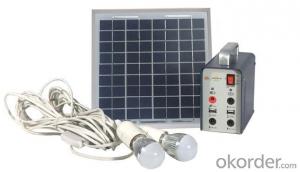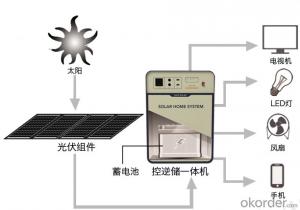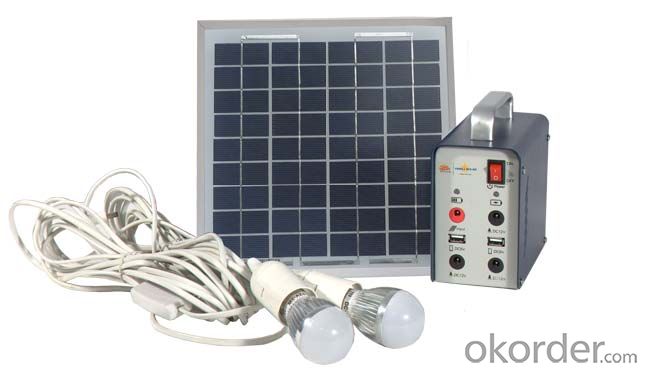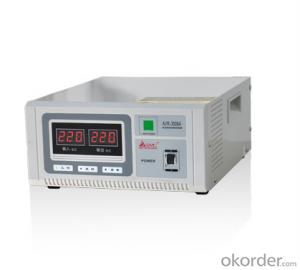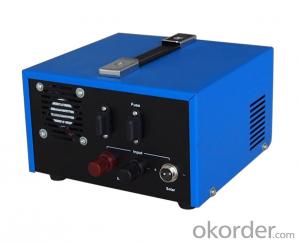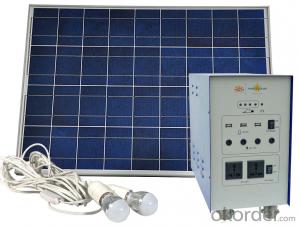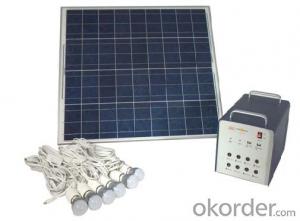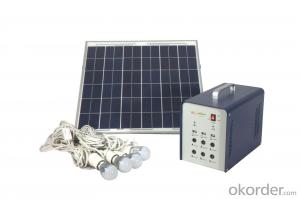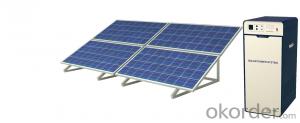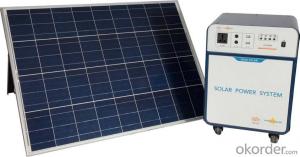Mirasol Solar Energy Systems Home Off-Grid Solar Power System DC Lighting JS-SPS-05
- Loading Port:
- Tianjin
- Payment Terms:
- TT OR LC
- Min Order Qty:
- 10 set
- Supply Capability:
- 10000 set/month
OKorder Service Pledge
Quality Product, Order Online Tracking, Timely Delivery
OKorder Financial Service
Credit Rating, Credit Services, Credit Purchasing
You Might Also Like
Off-grid Solar Power System
General Introduction
Solar power system provides alternating current and direct current, which is produced by the modules transforming solar power into power, to home lighting, household appliance and other DC appliance, such as cell phone and laptop.
Solar power system is widely used in area lack of power, for example house power supplying, monitoring, communication base, fire prevention in forest area, pasture and meadow, aquaculture etc.
We are dedicated to provide high quality off-grid PV products and systems to customers and has received a series of certificate, including ISO9001, TUV, UL, CE, CQC and RoHS.
General Introduction
Solar power system provides alternating current and direct current, which is produced by the modules transforming solar power into power, to home lighting, household appliance and other DC appliance, such as cell phone and laptop.
Solar power system is widely used in area lack of power, for example house power supplying, monitoring, communication base, fire prevention in forest area, pasture and meadow, aquaculture etc.
We are dedicated to provide high quality off-grid PV products and systems to customers and has received a series of certificate, including ISO9001, TUV, UL, CE, CQC and RoHS.
Solar DC Lighting System
Multiple protection system, safe and reliable performance.
Integrated and portable design, easy operation.
DC5V, DC12V, AC220V output, wide range application.
Clean engergy, cycle use.
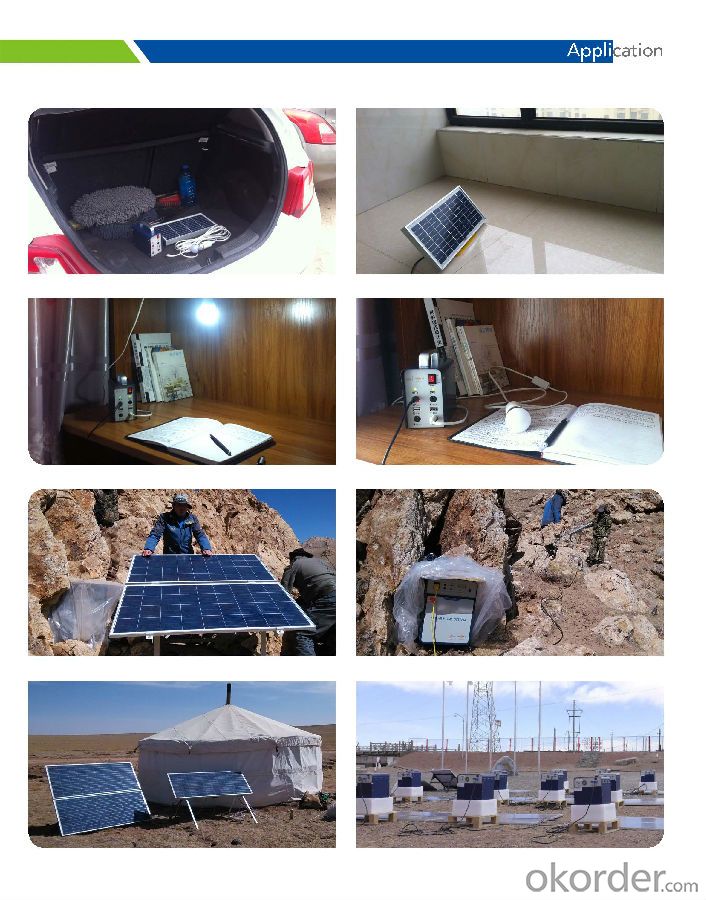
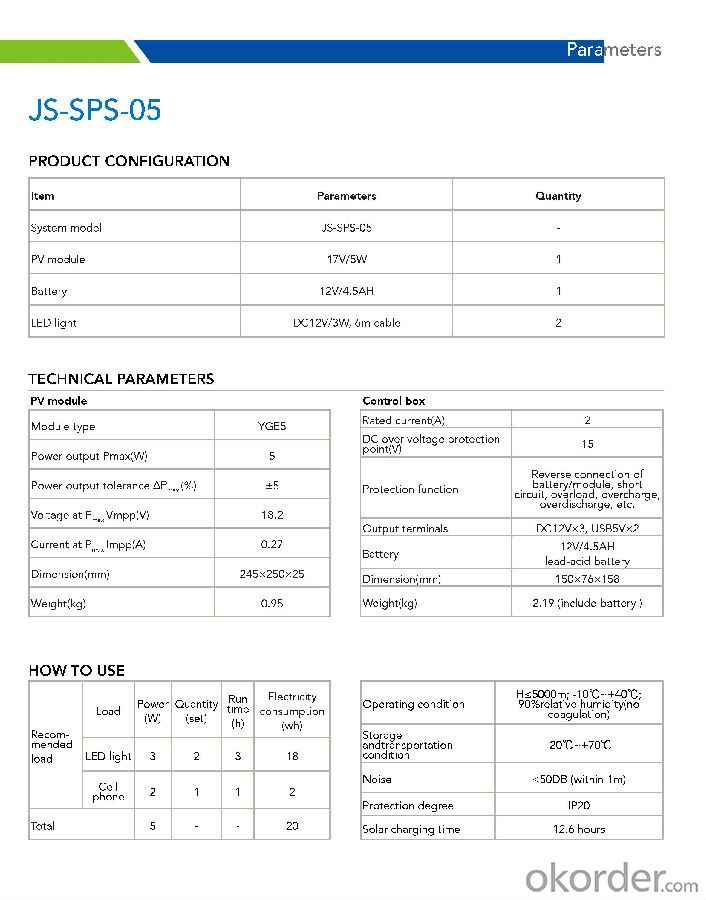

- Q: What are the different types of solar energy systems?
- There are primarily three types of solar energy systems: solar thermal systems, photovoltaic (PV) systems, and concentrated solar power (CSP) systems. Solar thermal systems use sunlight to heat water or air for various applications such as heating homes or generating electricity. PV systems directly convert sunlight into electrical energy using solar panels, which can be used to power homes or businesses. CSP systems use mirrors or lenses to concentrate sunlight onto a receiver, which produces heat that can be used to generate electricity.
- Q: What is the warranty period for solar energy systems?
- The warranty duration for solar energy systems can differ based on the manufacturer and the components of the system. Generally speaking, solar panels are accompanied by a 25-year warranty, ensuring their performance at a specific level throughout that time frame. On the other hand, inverter warranties typically span from 5 to 15 years. It's worth noting that the warranty period may vary between the product itself and the installation work, so it is crucial to thoroughly examine the warranty terms and conditions provided by both the manufacturer and installer. Ultimately, the warranty duration is crucial for guaranteeing the durability and dependability of solar energy systems, offering peace of mind to consumers.
- Q: Can solar energy systems be used in areas prone to earthquakes?
- Yes, solar energy systems can be used in areas prone to earthquakes. Solar panels are designed to withstand various weather conditions, including seismic activity. However, additional precautions may be required during the installation process to ensure the stability and safety of the system in earthquake-prone areas.
- Q: Can solar energy systems be used for powering electric vehicle charging stations?
- Yes, solar energy systems can be used to power electric vehicle charging stations. Solar panels can generate electricity from sunlight, which can then be used to charge electric vehicles. This not only reduces the reliance on fossil fuels but also helps in promoting clean and renewable energy sources for transportation.
- Q: How do solar energy systems impact the health and well-being of communities?
- Solar energy systems have a significant positive impact on the health and well-being of communities. One of the most significant benefits is the reduction in air pollution. Traditional energy sources such as coal and natural gas emit harmful pollutants that can cause respiratory problems, cardiovascular diseases, and even cancer. Solar energy systems produce clean and renewable energy, resulting in reduced air pollution and improved air quality. By reducing reliance on fossil fuels, solar energy systems also contribute to mitigating climate change. Climate change has numerous adverse health effects, including increased heat-related illnesses, the spread of infectious diseases, and food and water scarcity. Solar energy helps in reducing greenhouse gas emissions, which in turn helps to combat climate change and protect the health of communities. Moreover, solar energy systems have positive economic impacts on communities. They create job opportunities in the installation, maintenance, and manufacturing sectors. These jobs not only provide income but also contribute to the well-being of individuals and families. Additionally, solar energy systems can reduce electricity costs for households, freeing up financial resources that can be utilized for other essential needs, such as healthcare and education. Solar energy systems also enhance the resilience and reliability of energy supply in communities. They are decentralized and can be installed on rooftops or in smaller-scale installations, reducing the vulnerability of communities to power outages caused by natural disasters or infrastructure failures. This reliability ensures that critical services such as hospitals, schools, and emergency response centers can continue to function during power disruptions, ultimately protecting the health and safety of community members. Furthermore, solar energy systems promote energy independence and energy equity. Communities that have limited access to reliable electricity can benefit from solar energy systems, which can be installed in remote or underserved areas. This improves the quality of life for individuals in these communities by providing them with access to clean and affordable energy. In conclusion, solar energy systems have a profound impact on the health and well-being of communities. By reducing air pollution, mitigating climate change, creating jobs, enhancing energy resilience, and promoting energy equity, solar energy systems contribute to healthier and more sustainable communities.
- Q: Can solar energy systems be used in extreme weather conditions?
- Yes, solar energy systems can be used in extreme weather conditions. However, their efficiency may be affected to some extent depending on the severity of the weather.
- Q: Can a solar energy system be installed on a warehouse or industrial facility?
- Yes, a solar energy system can be installed on a warehouse or industrial facility. In fact, these types of buildings are often ideal for solar installations due to their large roof spaces and ample sunlight exposure. Installing solar panels on a warehouse or industrial facility can help reduce energy costs, decrease reliance on grid electricity, and contribute to a more sustainable and environmentally friendly operation. Additionally, solar energy systems can provide a backup power source during grid outages, ensuring continuous operations in critical industrial processes. With the advancements in solar technology and the availability of various financing options, it has become increasingly feasible and cost-effective to install solar energy systems on warehouses and industrial facilities.
- Q: Can a solar energy system be used in areas with limited sunlight?
- Yes, a solar energy system can still be used in areas with limited sunlight. While it is true that solar panels produce the most electricity when exposed to direct sunlight, they can still generate power even in areas with limited sunlight. Solar panels can still produce electricity on cloudy days or during periods of low sunlight, albeit at a reduced efficiency. Additionally, advancements in solar panel technology have made it possible for panels to capture and convert even diffuse sunlight, which means they can still function in areas with limited direct sunlight. Moreover, solar energy systems can be designed to include energy storage solutions such as batteries, allowing for the storage of excess energy generated during periods of peak sunlight for use during periods of limited sunlight. This ensures that solar energy can still be utilized in areas with limited sunlight, making it a viable and sustainable energy solution for various regions around the world.
- Q: How does the temperature affect the performance of solar panels?
- Solar panels' performance can be significantly affected by temperature. Typically, they operate at their highest efficiency when the temperature is around 25 degrees Celsius (77 degrees Fahrenheit). However, when the temperature surpasses this ideal range, the panels' performance can decline. The primary reason for this performance decrease is the composition of solar panels. They are made up of photovoltaic (PV) cells, which convert sunlight into electricity. These cells consist of semiconductors, mainly silicon, that generate electricity when exposed to sunlight. As the temperature rises, the PV cells' electrons gain more energy and move faster. This increased movement can lead to higher resistance within the cells. Consequently, the flow of electric current decreases, resulting in a decline in the solar panel's overall power output. Furthermore, the temperature increase causes a phenomenon known as the "thermal effect." While this effect slightly increases the voltage output of the solar panels, it is not proportional to the temperature increase. As a result, the panels' overall efficiency decreases. Additionally, higher temperatures can shorten the lifespan of solar panels. The excessive heat puts stress on the materials used in constructing the panels, leading to potential degradation and reduced durability over time. Although high temperatures have a negative impact on solar panel performance, they can still generate electricity in hot climates. To mitigate the effects of temperature, solar panels are often designed with heat dissipation mechanisms like air gaps, ventilation, or cooling systems. These mechanisms prevent excessive heat buildup and help maintain optimal performance. Ultimately, the impact of temperature on solar panel performance varies based on design and materials. It is crucial to consider temperature as a factor when installing solar panels and take necessary measures to maximize efficiency and longevity.
- Q: Can solar energy systems be used for powering off-grid eco-lodges?
- Yes, solar energy systems can definitely be used for powering off-grid eco-lodges. Solar panels can be installed on the roofs of these lodges to capture sunlight and convert it into electricity. This renewable energy source can then power various electrical appliances, lighting, heating, and cooling systems within the lodges. By harnessing solar power, off-grid eco-lodges can operate sustainably and reduce their reliance on traditional grid electricity, leading to a more environmentally friendly and self-sufficient operation.
Send your message to us
Mirasol Solar Energy Systems Home Off-Grid Solar Power System DC Lighting JS-SPS-05
- Loading Port:
- Tianjin
- Payment Terms:
- TT OR LC
- Min Order Qty:
- 10 set
- Supply Capability:
- 10000 set/month
OKorder Service Pledge
Quality Product, Order Online Tracking, Timely Delivery
OKorder Financial Service
Credit Rating, Credit Services, Credit Purchasing
Similar products
Hot products
Hot Searches
Related keywords
